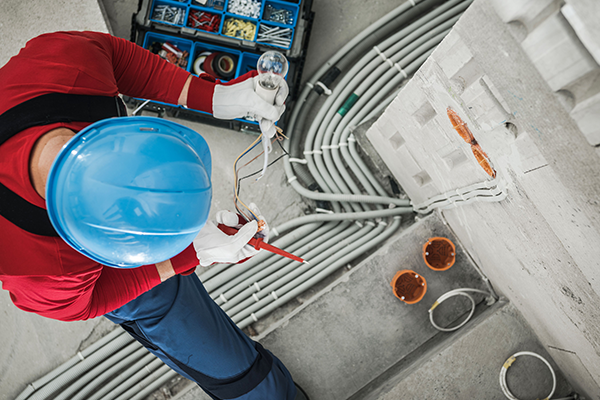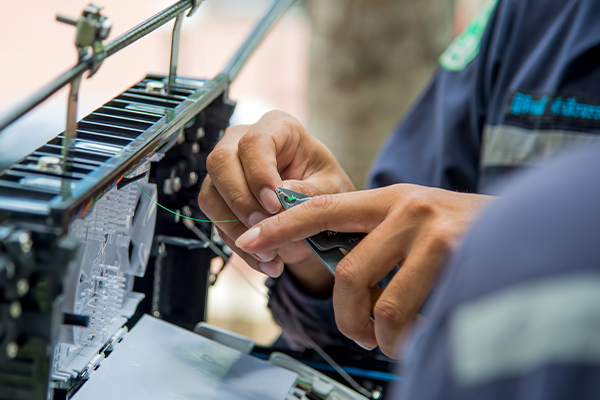Electricians are highly skilled tradespeople who play a crucial role in maintaining the electrical systems and networks that support our daily lives. They carry out essential tasks to install, maintain, and repair electrical systems in residential, commercial, and industrial settings.
To become an electrician, you must complete a four-year apprenticeship program. This involves a mix of on-the-job training with a qualified electrician, in addition to practical studies at a TAFE institution. During these four years, you will learn all of the necessary knowledge to excel in your new career and to enter the workforce as a nationally recognised electrician. Once you become a qualified electrician, you can enjoy the benefits of a highly valued career. With your work in high demand, you should expect to earn a competitive salary in a stable industry.

What does an electrician do?
Electricians are trained professionals who specialise in the installation, repair, and maintenance of electrical systems. Their skills are applicable to different residential and commercial buildings, as well as industrial facilities or construction sites. For example, an electrician is responsible for installing or replacing all the power points that supply electricity to modern homes.
They are specially trained to handle various electrical systems, including wiring, lighting fixtures, switches and circuits. They also express knowledge in analysing technical diagrams, troubleshooting faults and using tools and safety regulations to ensure accuracy. An electrician may specialise in a variety of areas, including emergency electrical repairs, installing internet systems, heavy machinery or residential housing, among others.
The tasks and duties of an electrician will typically include:
- Troubleshooting electrical issues
- Installing electrical systems, wiring, and equipment
- Reading and interpreting plans and blueprints
- Repairing or replacing faulty components, wiring and equipment
- Producing safety reports
- Diagnose electrical faults
- Install and test systems
- Assisting in the training and mentoring of apprentices.

Why become an electrician?
By becoming an electrician, you join an industry that is both in demand and stable. Particularly as technology continues to advance, our reliance on electrical systems increases with a greater need for skilled electricians. Demand is expected to continue growing based on recent forecasts, with a 10% growth predicted for electricians over the next few years. With the industry rapidly aging, there is also a growing demand for young workers.
Matching the demand, qualified electricians should expect to earn a good wage. As workers develop their experience, they can command yearly salaries of over $100,000. As you gain knowledge, it can also open doors for self-employment or potentially starting your own future business.
Like other trade jobs, working as an electrician is a great option for someone looking for hands-on work, particularly for those seeking the satisfaction of completing a new project or the fulfilment of solving a practical issue.
With problem-solving constantly at the centre of your role, working as an electrician can be mentally engaging too. It also provides a clear runway to building up your knowledge and experience in electrical systems, to eventually become a highly-skilled expert in the field.
What skills do electricians need?
Becoming an electrician involves developing specialist skills to ensure safety, precision and accuracy in every task. Some of the major skills you’ll need as an electrician include:
Soft skills
- Communication and a positive attitude - Strong communication will be key to conveying technical information, collaborating with team members and providing positive service to clients.
- Strong problem-solving - You will constantly have to deal with problems that present themselves, and it’s important to have a sharp mind to diagnose these faults and find solutions.
- Ability to withstand physical work - Parts of electrical work will involve lifting heavy equipment to navigate electrical hazards, with consistent practical labour. Being prepared to handle hands-on work will be key.
- Ability to work well in a team environment - Electricians frequently work with other electricians or trade professionals. Strong teamwork skills and collaboration can ensure a smooth workflow and successful completion of tasks.
Technical skills
- Working to a high technical standard - Fixing electrical systems requires strong attention to detail to ensure wiring is in the right position and installations are functioning accurately.
- Understanding of safety protocols - To ensure you keep yourself and others safe, you must have a strong awareness of safety standards.
- Sound understanding of mathematics and the ability to do calculations - Part of your role involves understanding complex technical concepts, including calculating electrical loads, interpreting wiring diagrams, and analysing how electricity flows through circuits.
- Understanding of computer and software tools - Electricians may also be required to understand specialised software tools such as CAD, to design electrical circuits. Furthermore, if you become self-employed, a sound understanding of computing may be needed when handling invoicing and accounting.
Pathway to becoming a qualified electrician
To become an electrician, you will need to complete an apprenticeship, where you can learn the necessary skills before applying for your electrical license. You can begin this process either straight out of high school or as a mature-aged student. Many people have found success entering a new trade at different stages of life, so whether you’re a teenager or an older worker seeking a career change, age should never be a barrier to becoming qualified.
The following steps will help ensure you're ready to hit the ground running as a certified electrician.
1. Consider completing a Certificate II in Electrotechnology (Career Start)
This is a 10-week course, offered through an institution such as TAFE Gippsland, which provides you with an introduction to an electrical career before fully committing to a future apprenticeship.
Throughout this course, you will be introduced to all the foundational knowledge for a successful apprenticeship. You will learn practical workplace skills, such as basic hand and power tool use, as well as an introduction to basic electrical circuits and routine problems. You can also expect to learn the skills needed to land your first job, including interviewing skills, resume writing and employment support. This 10-week course is delivered part-time, with entry requiring you to have passed Year 10 level maths or equivalent.
2. Complete a Certificate III in Electrotechnology Electrician (Apprenticeship)
Completing your Certificate III in Electrotechnology Electrician involves undertaking work experience as part of your apprenticeship. This four-year step prepares you with all the skills and knowledge for full-time work.
Your apprenticeship is where you gain first-hand experience. Through working with a qualified electrician, you develop your way around installing and repairing electrical systems. As well as gain skills in reading blueprints, troubleshooting faults, communication and teamwork.
As part of your apprenticeship, you will also be taught additional skills at TAFE for one day a week. Our course at TAFE Gippsland is designed to be as flexible as possible, to fit with your working schedule. You will be trained in both the practical and theoretical knowledge required to complement your ongoing work, including the skills to install, set up, test, or repair the electrical systems that you encounter. Once you have completed this course, you will be nationally recognised as a specialist in electrotechnology, and fully ready to apply for your electrician’s license.
3. Apply for an electrician’s licence
Once you have completed the first two steps, gained all relevant experience and earned your certificates, you’re ready to apply for your electrician license. Gaining an electrician license allows you to perform electrical installation work without the need for supervision.
Exact licensing and registration requirements will vary depending upon your state, but will typically require the completion of both a certificate III and a four-year completed apprenticeship. For information on how to apply for an electrical license, please check the licensing body in your home state for more information.
4. Ensure you have other relevant licences that may be required
Once you have earned your license, you are ready to begin full-time employment as a qualified electrician, although it is important to be aware of any relevant licensing requirements for specific work. These could include a working at heights certificate or confined space training, depending on the location of your work. Furthermore, if you are looking to work in construction, you will be required to obtain a White Card, which is a mandatory certificate that allows you to work on construction sites.
These certificates can all typically be obtained at a TAFE institution, with TAFE Gippsland providing the following training to get you best prepared:
- Work Safely at Heights
- Enter and work in confined spaces
- Prepare to work safely in the construction industry

How much do electricians get paid?
Electricians, like other skilled trade jobs, are constantly in demand across Australia. Highly valued by clients, this is reflected in their average salary. On average, you can earn $47.9 per hour, or approximately $88,000. As you gain experience, electricians should command salaries of $105,000 - $120,000. While completing your apprenticeship, students will typically earn an hourly wage of $24.95 or $55,553 per year.
Importantly, your wage depends highly on a variety of factors, including experience level, specialty, as well as whether you’re self-employed or work for a company. Location is also an important factor, as different regions have varying costs of living and labour demands that affect salaries. For instance, due to its strong mining sector, Western Australia has the highest average salary in the country, at $135,000.
If you enjoy hands-on work and value a career that is stable, lucrative and expected to grow in demand, then becoming an electrician is a brilliant choice. The steps to becoming fully qualified involve a four-year apprenticeship, with complimentary training from a TAFE institution. Over these four years, you will build confidence in your new career and gain valuable experience for a long and successful future. At TAFE Gippsland, we will ensure you are supported during every stage of your apprenticeship. Our certificates are taught by industry leaders, with expert knowledge to get you job-ready. If you would like to find out more, please contact TAFE Gippsland.